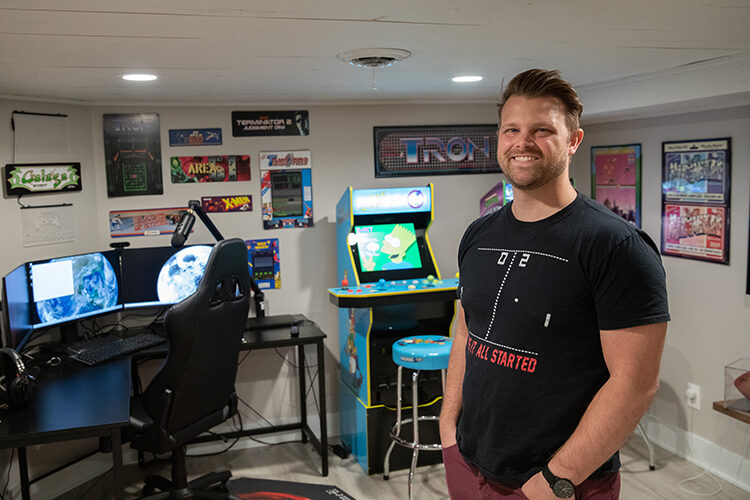Brandon Tschacher remembers when he typed “Milwaukee esports” into a search engine several years ago and it returned “a mishmash of disjointed entities.”
“This is the state’s largest metro area, and esports is a billion-dollar industry in the U.S.,” he remembers thinking. “If I can’t find information on how to get involved here, no one else will either.”
So in November of 2020, he began building what is now the MKESports Alliance, which hosted the first “esports summit” in Milwaukee in March 2022 with 150 attendees from 82 organizations. Esports refers to the world of competitive video gaming.
The ultimate goal of the alliance is to boost economic development around the sector in Wisconsin, said Tschacher, who graduated from UWM with a business administration degree in 2008. The esports ecosystem encompasses not just players and teams, but also the facilities, gaming lounges, marketing, and tourism and hospitality sectors.
Explosion of interest
Gaming tournaments go back more than 20 years, but the industry has exploded since the early 2010s, Tschacher said. And, while large tournament events aren’t frequent in Milwaukee yet, he is betting that the influence of the alliance will stimulate that trend.
Such a catalyst has helped other U.S. cities gain ground in attracting the different facets of competitive gaming in esports, he said.
“I do think that the alliance serves as a pretty critical differentiator between us and others at this moment,” said Tschacher, who also operates the Chalker Group, a business consulting company. “Cities like Atlanta, Kansas City and Seattle have grown their ecosystems around esports by forming a similar resource.”
Tschacher, who calls himself a “retro” gamer, still likes to play the games he grew up enjoying. But his real reason behind helping to cultivate esports in the state is his 3-year-old son, he said. “I’m interested in knowing where the technology will go during my son’s formative years.”
Involved in Startup Challenge
And he has some experience in building this kind of initiative.
While at UWM, Tschacher was one of the first students involved in the Startup Challenge, a program offered through UWM’s Lubar Entrepreneurship Center that trains students in the basics of starting a business.
He teamed up with Jeremy Tiedt and Justin Bohler to launch a business called MyCombine in 2008. Partnering with Zybeck Sports, the organization that provides the NFL their testing equipment, MyCombine gave sports teams and athletes of any ability the opportunity to test their skills using state-of-the-art equipment. Participants could also store their data and use it for future comparison. The three sold the enterprise in 2018.
Now Tschacher is a mentor not only to students in the Startup Challenge but also to teams participating in the UWM-led I-Corps Milwaukee program, which helps faculty and students in the region turn ideas developed in the laboratory into commercial products.
Promoting STEM education
Through the MKEsports Alliance, Tschacher also sees esports as an opportunity to promote STEM education – the disciplines of science, technology, engineering and math – areas that students otherwise may not consider. “When we say we have a gaming element to this, all of a sudden you have more people at the table,” he said.
The alliance has partnered with New Horizons of Wisconsin last year to create an esports and IT workforce development “badge” program, where participants who complete the training can show potential employers their competencies. That program has already produced 28 graduates.
Now he is exploring how esports might enliven K-12 education.
Working with New Horizons and Milwaukee Public Schools, Tschacher helped develop a summer camp program that introduces school-age children to a host of job opportunities around skills that help bring competitive gaming to life. The first such camp took place over the summer at MPS, and another is slated for the fall.
“Gaming is much more than controllers, players and a screen,” he said. “It’s the hardware and the software and lots of other aspects of information technology. But it’s also all these wrap-around jobs that are necessary to make esports succeed. It’s communications, it’s social media and marketing, it’s graphic design, it’s networking.”







